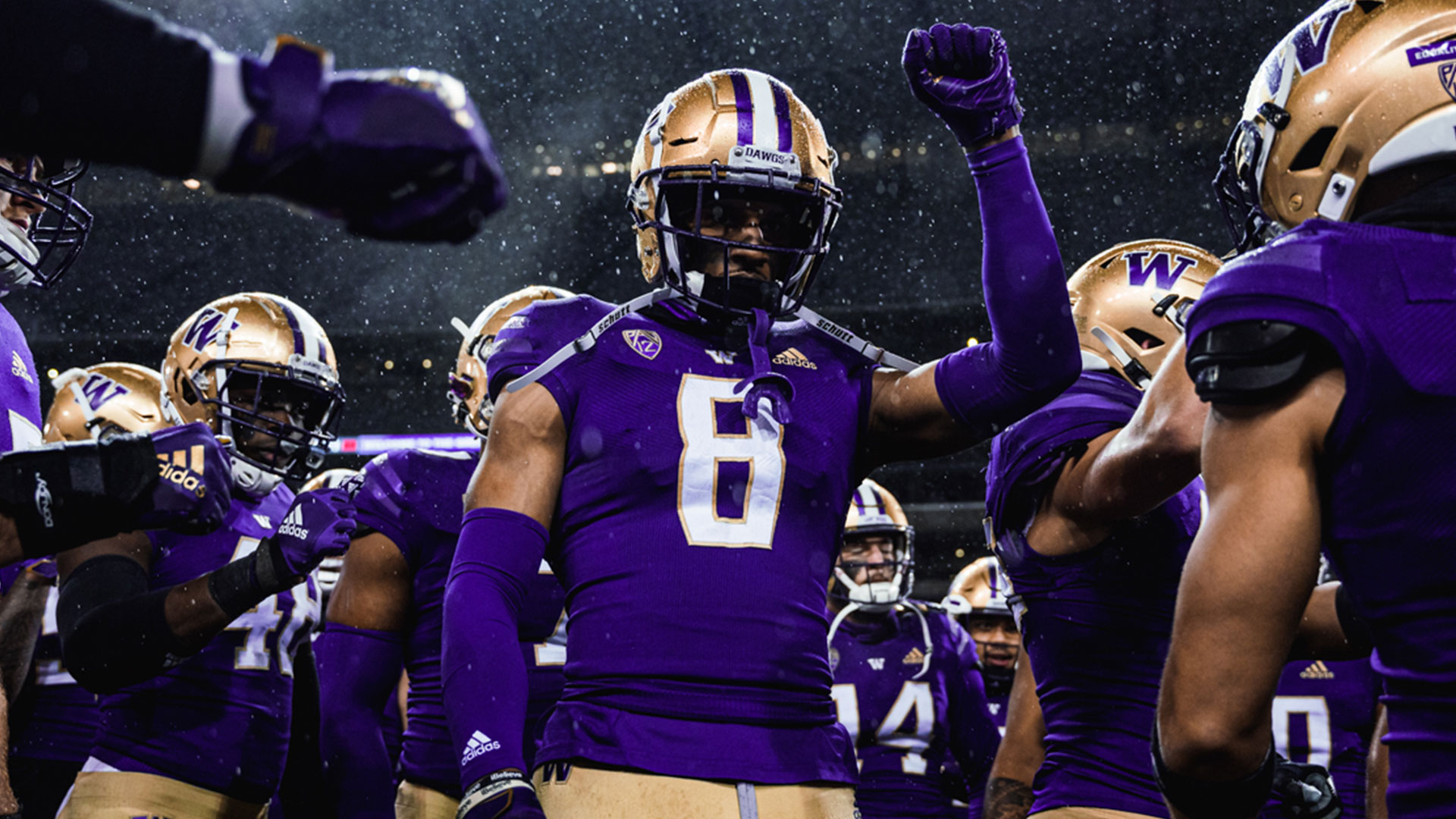The Panthers have drafted a lot of cornerbacks in recent years, after drafting three in the 2016 draft, they followed that up by selecting Corn Elder in 2017, Donte Jackson in 2018, Troy Pride and Stanley Thomas-Oliver in 2020 and now Jaycee Horn and Keith Taylor in 2021. While the likes of Horn and Jackson were drafted with the expectation that they would come in and contribute as starters right away, there is also a clear focus on adding competition at the position through day three picks.
While this started before Matt Rhule and Scott Fitterer arrived, this matches the approach to building the secondary that Seattle took nearly a decade ago, and while there were a lot of day three defensive backs that didn’t develop into Kam Chancellor or Richard Sherman, it looks as though this is an area they will continue to target until they hit on a core group.
The latest day three picks with a chance to take that leap is former Washington corner Keith Taylor, who the Panthers selected in the fifth round, and while the focus at cornerback for many will be on Jaycee Horn, Taylor is a player who has a chance to not only make the roster in 2021, but to compete for playing time alongside the likes of Horn and Jackson down the road.
So, with that in mind, what does Taylor show on tape, and how does he fit into the young secondary that the Panthers are assembling? We’ve taken a look at the tape to find out.
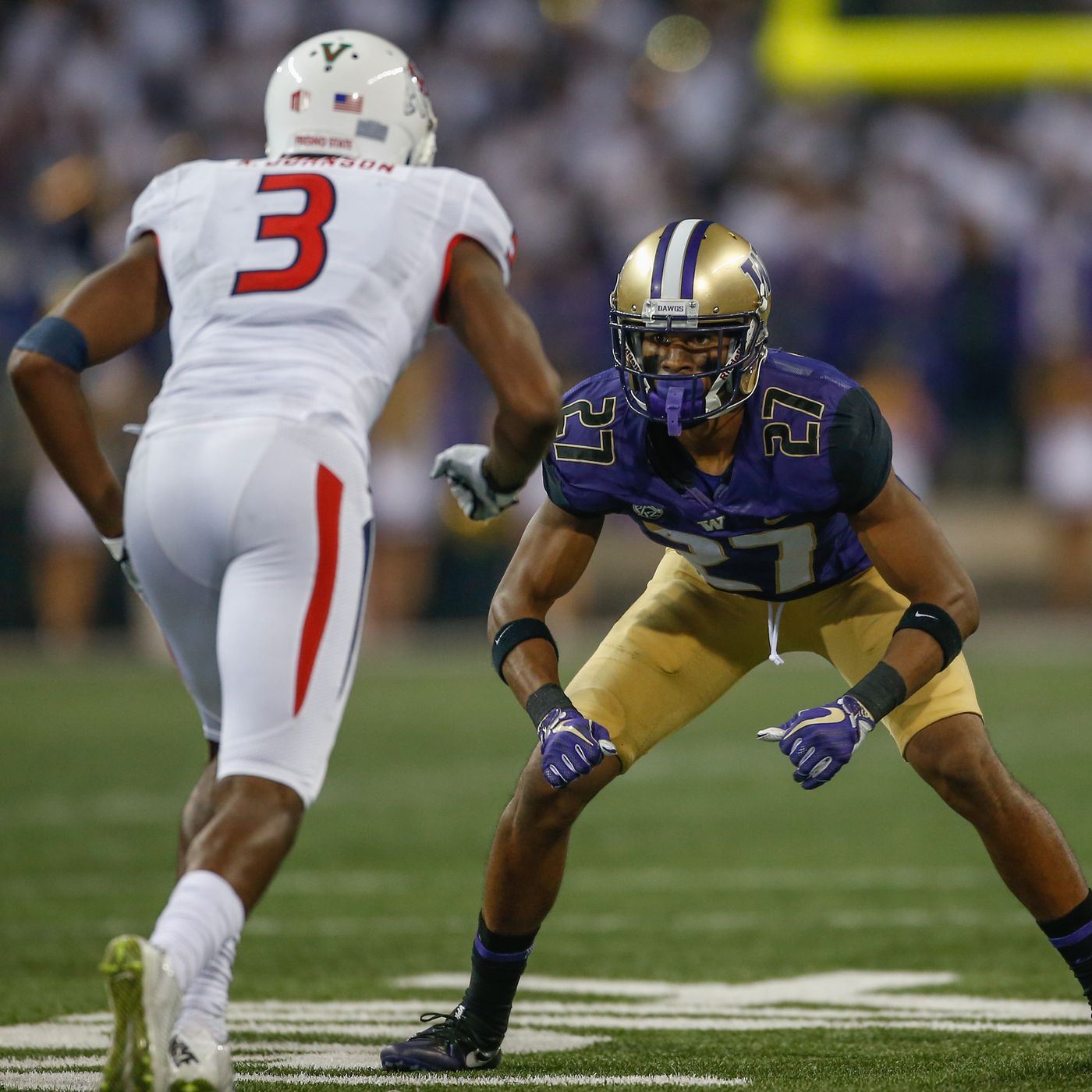
Photo Credit: Otto Greule Jr/Getty Images
From a coverage perspective, Taylor isn’t a pure burner but has the speed to run vertically with receivers in man coverage (Taylor wore #8 in 2020):
This is aided by his ability to transition vertically with limited wasted motion:
However, in off-coverage he does tend to get a little flat-footed and needs to make sure that he does stop his feet as this can make him slow to react out of his breaks or when transitioning from off coverage:
One thing that the Panthers have emphasized this offseason is that they plan to play a much more even mixture of man and zone coverages, and while he will likely be somewhat match-up dependent at the NFL level in man coverage, he does show the ability to mirror receivers through routes:
And while a lot has been made about just how physical Jaycee Horn is as a defender, Taylor is also more than willing to make his presence known:
Where he does need to show he can be more effective, however, is in true press coverage, as with his length he should be able to be highly effective in this regard but spent most of his time at Washington playing just off the line of scrimmage. This is something that he mentioned the Panthers’ coaches had spoken to him about during the Senior Bowl week:
“He told me to work on using more hands at the line of scrimmage. Not giving too much ground from a press standpoint,” said Taylor.
While his arms are not quite of the same scale as Jaycee Horn, he still has more than enough length to press effectively at the line of scrimmage and is another player who has the ability to match-up with the bigger receivers around the NFC South.
Importantly, and this is another common theme between Taylor and Horn, he does a good job of contesting at the catch point to force incompletions in man coverage:
As a man coverage player, Taylor will likely have some limitations in terms of matching up with smaller, twitchier receivers, but he is another bigger outside corner who can play press man coverage against bigger receivers.
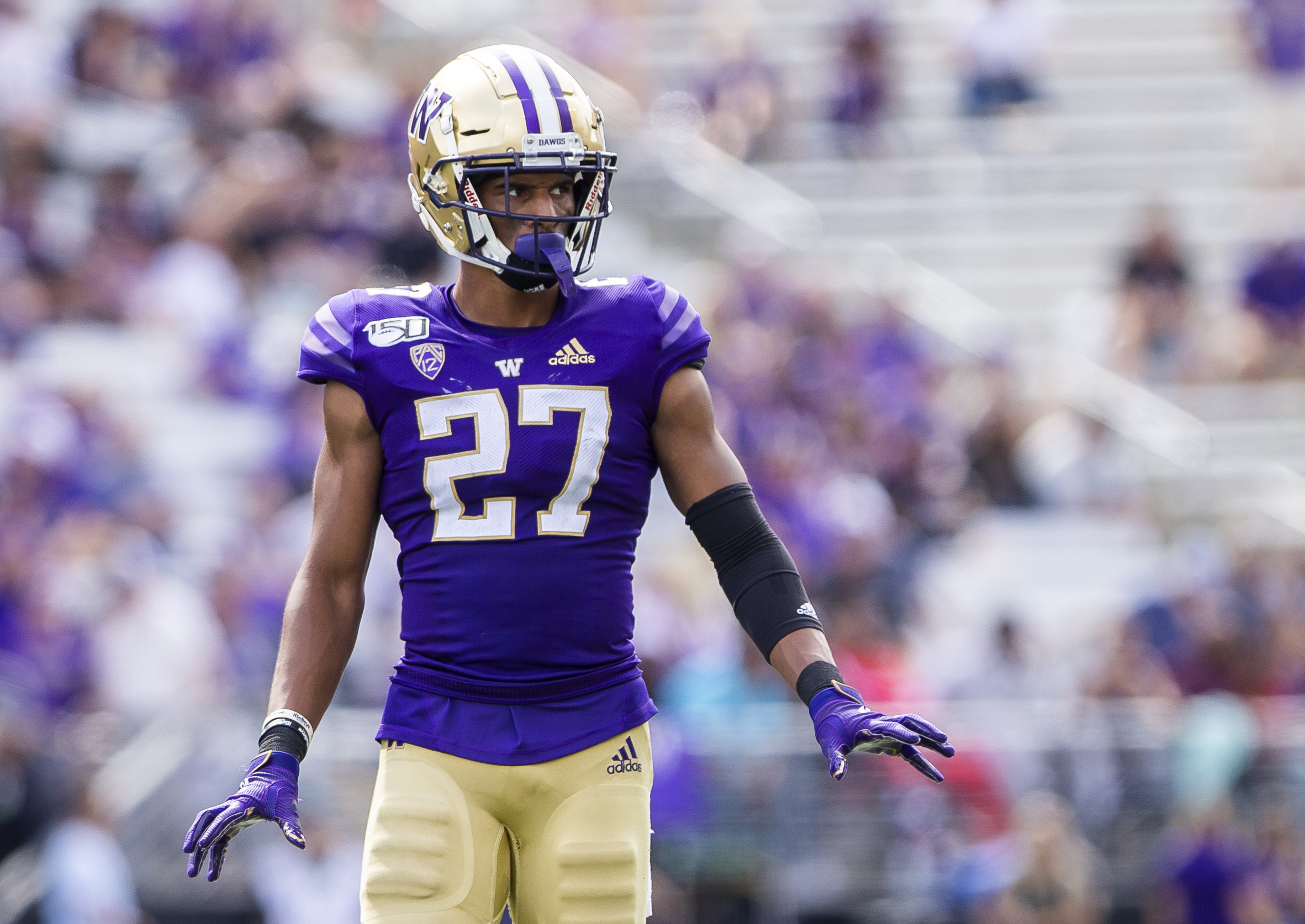
Photo Credit: University of Washington Athletics
In zone coverage, he shows a reasonably smooth backpedal in deeper zone coverages:
However, he can be a little slow to break on underneath routes, and he could stand to continue to refine his footwork to allow him to drive on routes more effectively:
The biggest critique of his play in zone coverage especially has been his lack of interception production, and this is something that Taylor spoke to following his selection:
“When some of those opportunities came, I just didn’t cash in” admitted Taylor.
Watching Taylor on tape, it is clear he is far from a natural catcher of the ball, and while this is something that can be worked on to some degree, the best case scenario in terms of ball production is likely going to be similar to that of James Bradberry, who has been able to make an interception or two each season of his NFL career, but who also leaves a fair few plays out there.
This isn’t the end of the world, and Taylor should still be able to be an effective zone coverage player without ball production, but whereas Jaycee Horn has ball skills that should show up if he is asked to play more zone coverage, it is unlikely that Taylor will ever show that kind of upside in zone coverage.
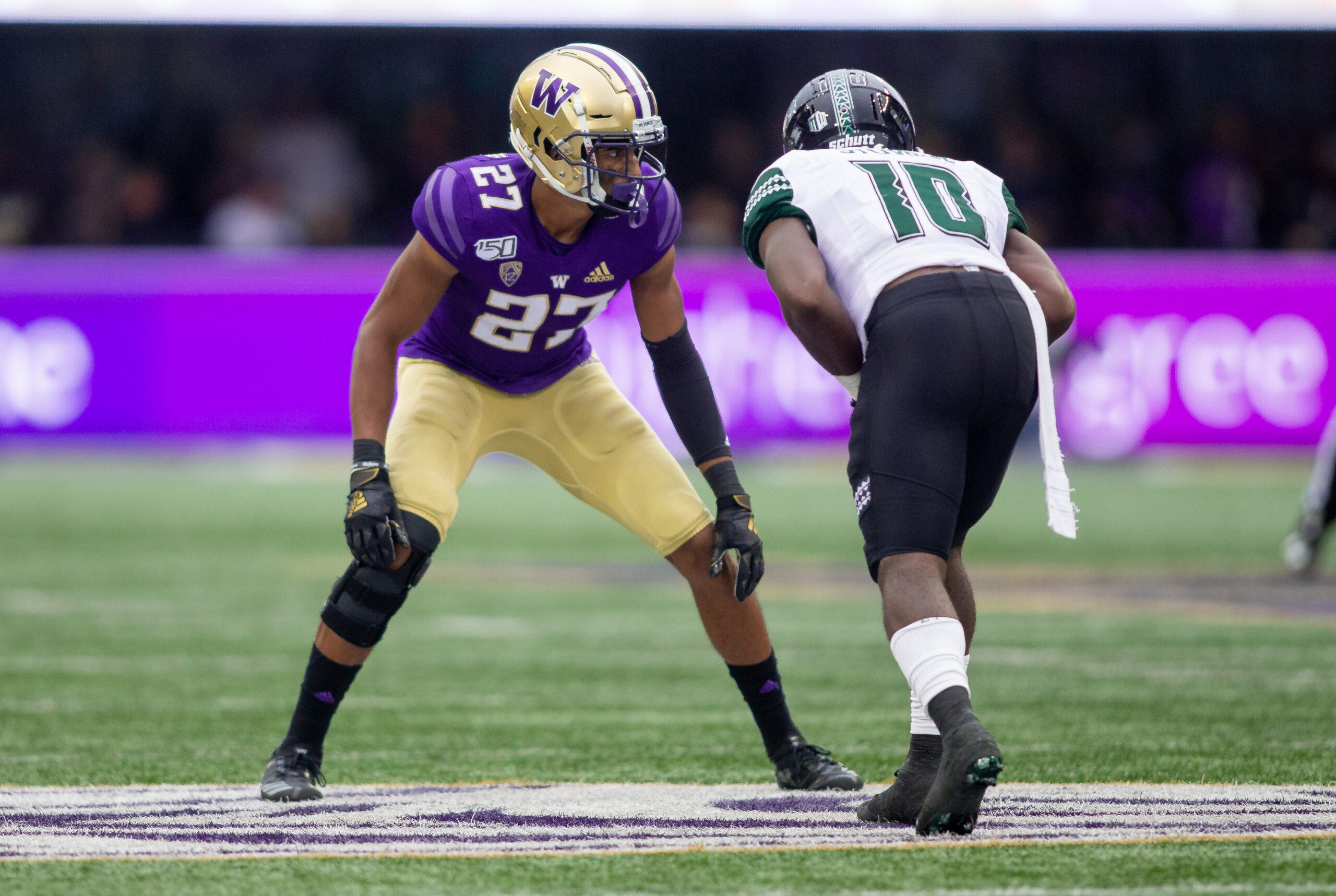
Photo Credit: Scott Eklund/Red Box Pictures
The other aspect of his game that needs considering is his run defense, something that Matt Rhule stressed when talking to the media during rookie minicamp:
“You think of cornerbacks in the NFL as being cover guys, but most offenses are designed to block everybody else and make the corner make the tackle” explained Rhule.
While nobody is expecting a cornerback to play the run like a linebacker, they need to be able to play their part in the wider scheme. While Taylor does do a pretty good job of compacting gaps and putting himself in the right place to push the ball back inside when playing on the front side of plays, he isn’t particularly effective at taking on blocks and needs to get lower to counter power and be more proactive with his long arms:
He does do a good job in pursuit, however, and is aggressive in working back to the ball from the back side of plays:
However, as a tackler, he needs to improve technically as too often he works himself off-balance too early, and while he does a good job of getting low to try and wrap around the legs, he needs to make sure this doesn’t come at the expense of balance as too often he fell victim to late changes in direction that left him attempting to arm tackle:
As a run defender, Taylor isn’t bad, but he currently isn’t especially good either. He shows a good understanding of where he needs to be and is unwilling to make contact but needs to continue to work on his hand usage when taking on blockers on the front side of plays as well as continuing to work on his footwork as a tackler.
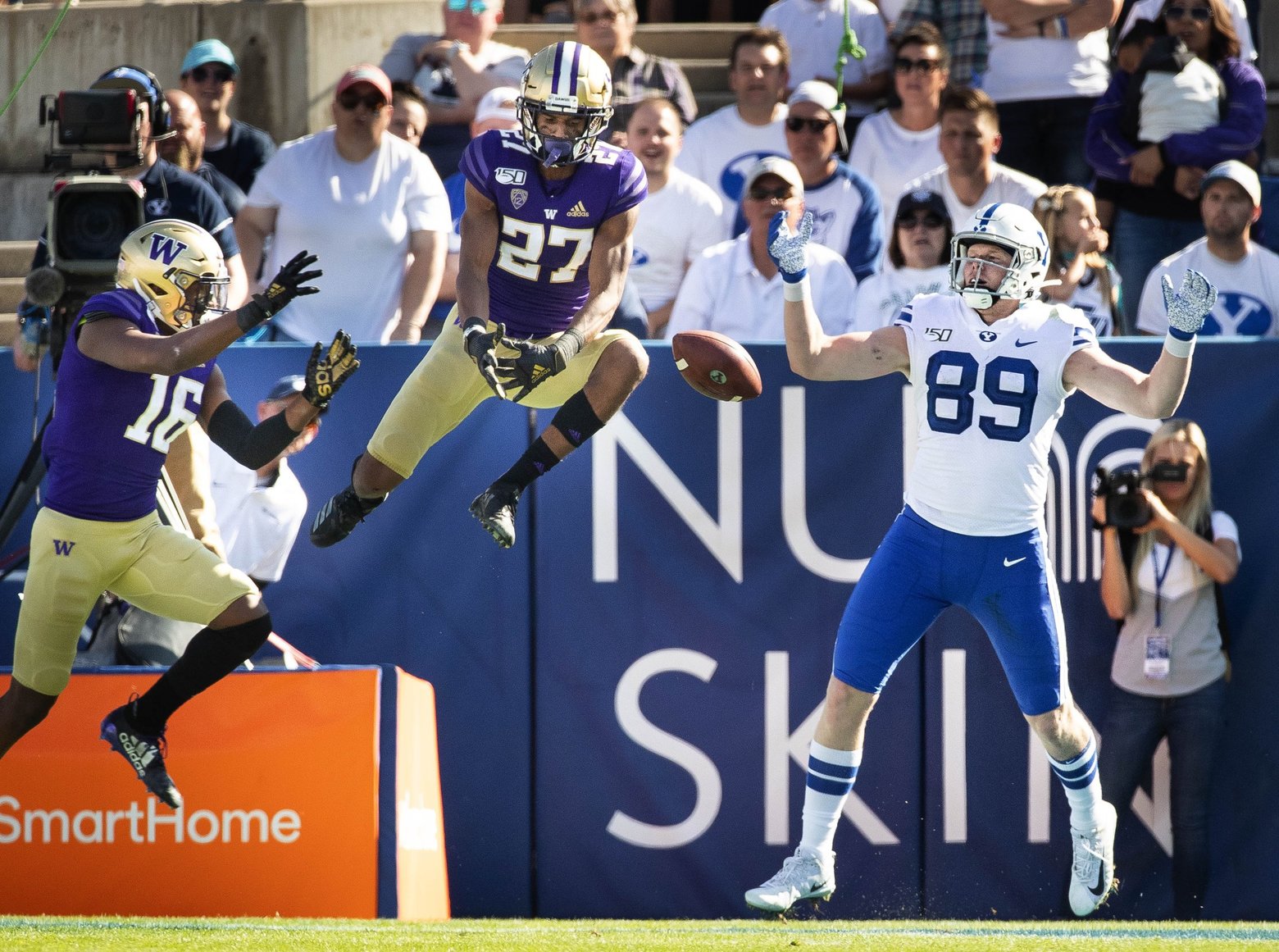
Photo Credit: Dean Rutz / The Seattle Times
Ultimately, Taylor is unlikely to see the field a huge amount as a rookie unless there are injuries ahead of him on the depth chart. With AJ Bouye back from a suspension in week three he should be expected to contribute mostly on special teams as a rookie before potentially being asked to play a more significant role on the defense in 2022 and beyond. Matt Rhule said as much when speaking to the media during rookie minicamp:
“We have two big, long, fast athletics guys that we just have to train in our system and see where they get to” explained Rhule.
Of course, Jaycee Horn will be expected to start as a rookie barring some set-back, but Taylor will likely follow a similar path to what the Panthers hoped to do with Troy Pride a year ago, who will now be tasked with competing for playing time in order to earn a roster spot.
With five cornerbacks on the roster on the rookie contracts, as well as recent free agent signings AJ Bouye and Rashaan Melvin on the roster, there is going to be real competition for places on the final 53, but if Taylor can make progress in camp and convince the coaches that he both has the developmental upside to merit patience and an ability to step into playing time on defense should that be required, then he has a chance to not only make the roster in 2021, but also to develop into a solid starting option with time.
(Top photo via University of Washington Athletics)

